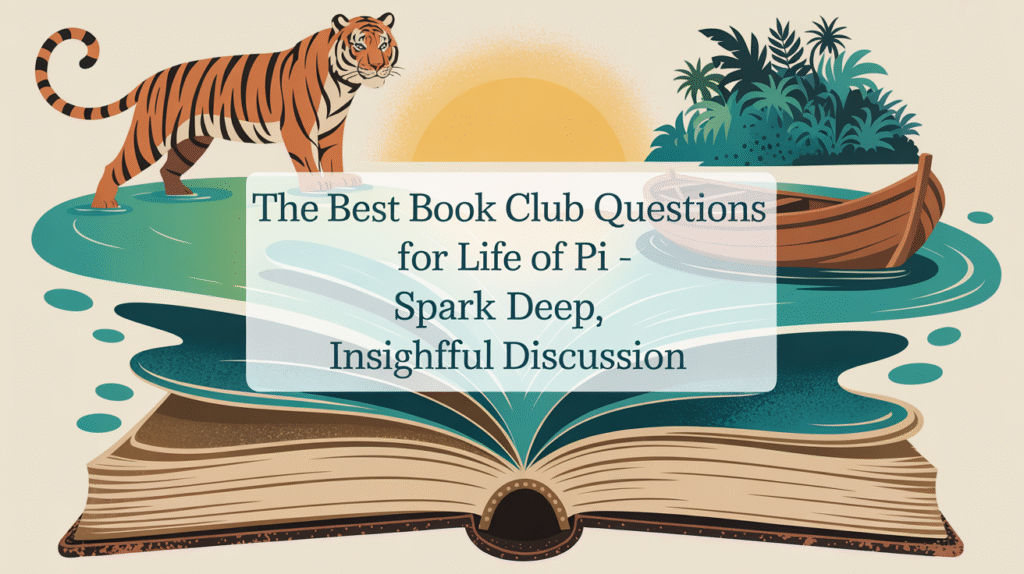The best book club questions for Life of Pi are the ones that spark meaningful conversation about belief, storytelling, survival, and morality. Yann Martel’s novel is layered with themes and ambiguity, making it a perfect choice for deep group reflection.

Here’s a list of curated discussion prompts, along with guidance to help book clubs explore the novel’s most thought-provoking aspects.
Start with Story and Structure Questions
Before diving into abstract themes, start your book club discussion by examining how the novel is built.
Discuss the Framing Device
- What effect did the frame story (author interviews, the adult Pi) have on your reading experience?
- Did it make Pi seem more trustworthy or less?
Analyze the Two Versions of the Story
- Which story did you believe—and why?
- How does the presence of both versions influence your understanding of the book’s message?
Explore Belief, Faith, and Religion
One of the novel’s central themes is faith—not just religious faith, but belief in stories, meaning, and survival.
Pi’s Practice of Multiple Religions
- What do you think of Pi’s decision to practice Hinduism, Christianity, and Islam simultaneously?
- Is the novel advocating for religious pluralism, or is it saying something else?
The Nature of Belief
- What does Martel mean by “a story that will make you believe in God”?
- Does the story succeed in doing that for you?
Dig into Character Development
Pi is a complex protagonist whose emotional and spiritual journey is central to the story.
Transformation Over Time
- How does Pi change from the beginning of the book to the end?
- In what ways does trauma shape his identity?
Relationship with Richard Parker
- What role does the tiger play in Pi’s survival—physically and emotionally?
- Do you think Richard Parker is a real tiger or a metaphor?
Analyze Symbolism and Imagery
Martel uses rich symbolism to deepen the narrative, and each reader may interpret it differently.
The Role of the Ocean
- What does the Pacific Ocean symbolize throughout the novel?
- How does its portrayal change based on Pi’s emotional state?
The Floating Island
- What are possible symbolic meanings of the carnivorous algae island?
- Is it a spiritual test, a hallucination, or something else?
Examine Morality and Survival
The novel presents ethical dilemmas, especially when Pi is forced to abandon his values to survive.
Crossing Moral Lines
- Do you think Pi’s choices on the lifeboat were justified?
- Would you have acted differently in his place?
Violence and Humanity
- How does the novel portray violence—especially through the animal and human versions of the story?
- What does it say about the line between civilization and savagery?
Reflect on Tone, Language, and Writing Style
Martel’s prose plays a significant role in how readers connect with the story.
Language and Imagery
- What did you think of the writing style? Was it poetic, philosophical, or distracting?
- Were there any passages that stood out to you?
Humor and Irony
- Despite the tragic circumstances, the book uses humor. Did it work for you?
- How does irony help or hinder the message?
End with Broader Themes and Personal Reflections
Wrap up your discussion with questions that link the book to broader philosophical and emotional ideas.
Storytelling and Truth
- What do you think the novel is ultimately saying about the nature of truth?
- Is storytelling more important than fact?
The Role of Animals and Nature
- How do the animals reflect human qualities or roles in Pi’s life?
- What is the author suggesting about the human-animal connection?
FAQ: Book Club Discussion Questions for Life of Pi
Here are some questions and answers about using Life of Pi in book club discussions.
What are the best themes to explore in a Life of Pi book club?
Themes like belief, truth, survival, storytelling, and the duality of human nature offer the richest discussions.
How can I structure a Life of Pi book club meeting?
Start with character and plot, then move to themes and symbolism. End with personal reflections and the big philosophical question: “Which story do you prefer?”
Is Life of Pi too complex for casual book clubs?
Not at all. It invites both casual reading and deep analysis. Even first-time readers can find entry points in the survival story and emotional journey.
Should we discuss the film adaptation during the meeting?
Yes, if members have seen it. Comparing the book and film can highlight different interpretations and storytelling choices.
What’s the most important question to ask?
“Which version of Pi’s story do you believe—and what does that say about you?” This question reveals personal beliefs and starts powerful conversations.
Yann Martel’s Life of Pi is a novel designed for group discussion. Its layers of ambiguity, emotional weight, and philosophical themes ensure that every member of your book club will leave with new insights—and probably more questions than answers.
